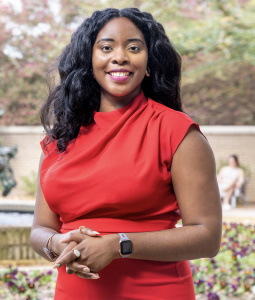Arnold School Awards
Gerry Sue Arnold Alumni Award: Chynna A. Phillips
Chynna A. Phillips began working at the Sisters of Charity Foundation of South Carolina when she was completing her combination degree at USC. While a student in the Master of Public Health in Health Services Policy and Management and a Master of Social Work (focus in health and mental health) program, Phillips joined the Foundation in 2016 as a graduate research assistant. In the years since, she has steadily climbed the ranks to her current role as Senior Director of Policy and Research – making an impact every step of the way.
“Through a social determinants of health lens, Ms. Phillips ensures that we approach our endeavors with the understanding of the broad and sweeping systemic barriers that individuals experiencing poverty face,” says Donna Waites, president. “Her approach to the work is respected by leaders across the philanthropic and nonprofit sectors and continues to inform the need for systems-level change.”
Phillips’ path to public health began when she was a nursing student at Xavier University. While treating a patient for lung disease caused by mold and asbestos, she began thinking about the larger factors that led to this condition – factors that disproportionately affect marginalized groups. She shifted her focus to prevention and advocacy by attending USC, which offered the perfect dual degree to understanding both communities and broader, systems-level policies and structures.
Phillips has applied this passion and the knowledge she gained from her master’s programs to her work at the Foundation. For example, ever since she led the nonprofit’s statewide poverty study (in partnership with the Arnold School’s Rural and Minority Health Research Center) in 2020, she’s been in high demand for lending her expertise to new projects and collaborations, such as the coordination of strategic partnerships across the state through the Anti-Poverty Advocacy Agenda.
“The thing that is most notable about Ms. Phillips is her dedication to serving others. Whether working alongside community members as a volunteer, or as an instructor in the College of Social Work, her level of comfort and engagement in collaboration in varied settings is evident,” says Melinda Merrell, clinical assistant professor of HSPM and graduate director for the MHA program. “Professionals like Ms. Phillips who are determined to pursue policy change are the future leaders we are lucky to have in South Carolina as we work to reimagine systems that work for all people.”
This award is open to all alumni who graduated less than 10 years prior to the current year. Alumni whose work has both made a difference to the profession and in the health of an identified community or population are eligible for this award.
Norman J. Arnold Alumni Medal: Michael Wirth
A mainstay of the Arnold School since 2007, Michael Wirth first came to USC to study epidemiology. He ended up earning two degrees in the field and remained at South Carolina to pursue a career in teaching and research.
Today, Wirth holds dual appointments as an assistant professor with the College of Nursing and the Arnold School’s Department of Epidemiology and Biostatistics. During his 15 years at USC, he has developed expertise in circadian rhythms and dietary inflammation.
The American College of Epidemiology Fellow combines these two areas in his research program to examine how sleep, diet, physical activity and other factors impact health outcomes. He focuses on populations with unique schedules, such as nurses who work shifts at hospitals – pioneering a new field known as chrononutrition where he looks at the timing of nutritional intake in the context circadian rhythms.
“Dr. Wirth has done a superb job of researching factors related to diet and physical activity within the broad category of circadian biology,” says Health Sciences Distinguished Professor of Epidemiology James Hébert. “Given that Nobel prizes have been awarded recently in the area of circadian biology, I think that he is onto something really important here.”
Originally from the Philadelphia, Pennsylvania area, Wirth envisioned a career in pharmacy until hearing a talk by an epidemiologist while completing a summer research program as an undergraduate. The scientist helped Wirth realize that epidemiology offered the perfect combination of his interests in anatomy, physiology and math.
At the Arnold School, Wirth completed Master of Science in Public Health in Epidemiology and Ph.D. in Epidemiology degrees, participating in USC’s NIH-funded predoctoral fellowship Behavioral Biomedical Interface Program during his doctoral studies. Conducting research alongside Jim Burch, Hébert and other epidemiology faculty, Wirth developed his specialty in circadian biology and dietary inflammation.
“Circadian biology is infused into so many physiological and mental health systems and mechanisms, but this is something that many do not realize or have thought about,” he says. “I hope my work and the work of others will open the minds of other researchers to include some aspect of circadian biology in their work because it is so vital to health – both physical and mental.”
This award is open to all alumni who graduated more than 10 years prior to the current year. Eligible alumni should demonstrate work that has had both a positive impact on the profession and on the health of an identified community or population and has brought recognition to the Arnold School of Public Health.

